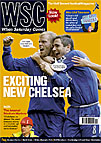 Manchester Utd and Arsenal play out yet another ill-tempered game
Manchester Utd and Arsenal play out yet another ill-tempered game
“That game, with the baggage that goes with it, is almost becoming an impossible match to referee, and I speak from personal experience.” So said former Premiership referee Jeff Winter after the latest outbreak of hostilities between two implacably opposed foes, an event also known as Man Utd v Arsenal.
It is difficult to recall another match in recent football history that had been preceded by so much hype, certainly not one for which players had been warned beforehand by the police about their behaviour possibly generating crowd disorder. It was built up like a boxing match (the strapline on the poster would have read “This time it’s personal…”). In boxing, acrimony – whether real or imagined – sells tickets and few writers doubt that the occasional scuffles that break out at pre-fight press conferences and weigh-ins aren’t at times stage-managed to boost flagging box office.
From a pay-per-view point of view, this could work for football. Lots of people have no interest in who wins this game, but if they think they will see some rough stuff they will likely tune in. As the build-up to kick-off in grounds becomes increasingly bombastic (“The players are in the tunnel,” bellows the announcer as Carmina Burana blasts over the PA) it has come to resemble the sort of nonsense that used to precede the arrival in the ring of Naseem Hamed. How long before Thierry Henry or Roy Keane are lowered from the gantry mounted on a roaring Harley Davidson?
On Sky Sports the game had been trailed relentlessly for weeks before. With the Premiership looking an increasingly deflating one-and-a-half-horse race even in October, there was something of the twitching corpse about attempts by Murdoch Inc’s schedulers, along with their friends at the Sun, to sell this early-season game as a seismic event. Even if it had been a goalless draw with no bookings, every incident was always going to be magnified and endlessly replayed. Far from seeing it as the “disgrace” described by sections of the media, neutral spectators probably quite enjoyed the evident loathing between the two camps, who resemble one another much more closely than they would like to think.
Nonetheless, the mutual whingeing about violence and alleged cheating presented a stark and depressing reminder of how match officials are often perceived by footballers and managers at the top level. Mike Riley did not have a good game, notwithstanding the Rooney penalty decision, which looked right from his viewpoint. Mindful perhaps of the antagonistic build-up to the game, he tried to be lenient by not booking anyone for 35 minutes, by which time there had been several challenges that might have brought a yellow card in another match. But by the time he had imposed some authority the game was pretty much out of control.
So who referees the next one? Given that any official for this fixture seems likely to be held culpable by whichever side comes off worse, it wouldn’t be a surprise if some referees were to refuse an invitation to Highbury on February 1. In the 1950s, English referees were flown out to Argentina to take control of Buenos Aires derbies that were deemed to be beyond the control of local officials. Are we now at the point where Anders Frisk will be invited over in the hope that Gary Neville and Patrick Vieira will have sufficient respect not to follow him about the pitch shouting in his face? Better still, Urs Meier or Kim Milton Nielsen could take charge, both hate figures the viewers would really get behind. But the solution probably lies with the two managers. In future, Arsène Wenger and Alex Ferguson could take charge of a half each, thereby cementing the fixture’s resemblance to a school playground match.
United’s comprehensive defeat at Portsmouth the next week and Arsenal’s continued failure to sweep aside the cream of Greece and Holland in the Champions League throw the furore surrounding the game into embarrassing relief. This was English football at its most insular. Caught up in its own internecine bombast, the Premiership looks increasingly like the WWF of the European game: a cartoonish, overblown and theatrical imitation of top-level sport. Wenger in particular made much of the global audience watching the events at Old Trafford. How would they react to such a terrible example being set, he asked? Probably by laughing.
And then, if they’re in Italy or Spain, by looking forward to a Premiership-free final stages of the Champions League and the UEFA Cup.
From WSC 214 December 2004. What was happening this month